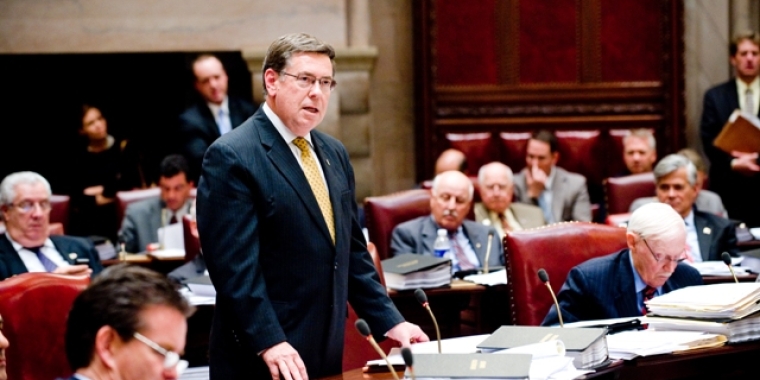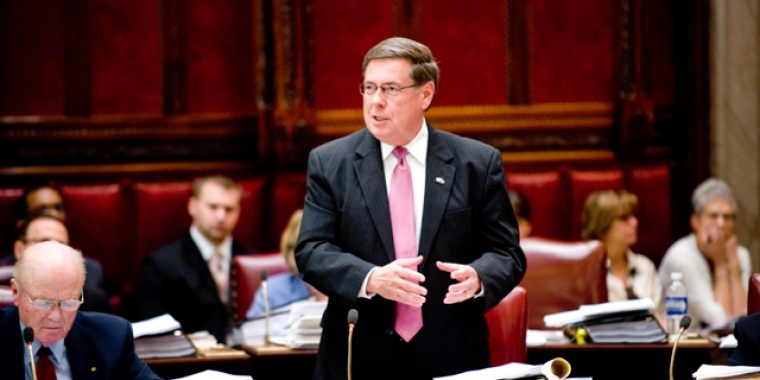
Jobs and Opportunity Agenda Will Boost State's Business Climate
Jeff Bishop, Communications Director
February 13, 2018

ALBANY, 02/13/18 - State Senator James L. Seward (R/C/I/Ref – Oneonta) today joined his senate colleagues to unveil a broad-based Jobs and Opportunity Agenda designed to help the state become more competitive, improve job creation, and make the state more business-friendly. The senate plan will save small businesses more than $1.1 billion in taxes, cut red tape, reduce regulatory burdens, invest in workforce development, and strengthen New York’s economic development programs.
“At the start of the legislative session, I pledged to advocate for state policies that would boost job opportunities across the state – the new senate Jobs and Opportunity Agenda upholds that pledge,” said Senator Seward. “This comprehensive plan will improve our economic climate, encourage business growth, and give people a reason to make New York State their home.”
Components of the Jobs and Opportunity Agenda will be included in the senate’s state budget proposal that will be acted on in March.
“Lower taxes and better jobs – those are among the top concerns I hear from people every day. This Jobs and Opportunity Agenda addresses those concerns and will help rejuvenate the Empire State,” added Seward.
The Jobs and Opportunity Agenda includes:
Cutting Taxes on Small Businesses:
To help New York’s vitally important small businesses succeed, our plan includes lower business, property, energy, and income taxes. It builds upon existing senate tax reduction successes, including the $23 billion in savings by enacting a property tax cap and keeping state spending at two percent the past seven years. Both of these initiatives are proposed to be made permanent in the Senate Majority’s plan. It also continues to support the implementation of the middle-class income tax cuts that is bringing $4.2 billion in relief to tens of thousands of small businesses. Additional tax cutting initiatives amounting to more than $1.1 billion in new savings include:
· New Tax Cuts for Businesses - $495 million: Reduce the amount small businesses and farms must pay in taxes by increasing the corporate tax threshold from $390,000 to $500,000 and lowering the rate to 2.5 percent. The proposal also expands the small business exemption to all businesses filing the personal income tax regardless of whether they have employees, increases the threshold to $500,000, increases the exemption to 15 percent, and increases the exemption to 20 percent for farmers;
· Create STAR for Small Businesses - $275 million: Allow real property owned by a small business (100 or less employees) to be eligible for the STAR property tax savings program;
· Reduce Energy Taxes - $280 million: Eliminate the two-percent gross receipts tax on utility bills, resulting in $190 million in savings. Energy tax cuts would also expand upon the savings achieved when the Senate Majority phased out the onerous 18-A energy tax surcharge opposed by Senator Seward when it was enacted several years ago. Now that the surcharge has been eliminated, the Senate Majority’s proposal would go even further by eliminating the base, underlying 18-A assessment tax and have the $90 million in savings come from the state’s general fund;
· Tax Relief to Boost Manufacturing - $90 million: This legislation would extend the zero percent corporate franchise tax parity to all manufacturers in New York regardless of how they are organized. Currently, only approximately 25 percent of manufacturers – those organized as C corps - can receive the zero percent rate on business income.
Strengthening the State’s Economic Development Programs:
Several of New York’s economic development programs and strategies are not producing the results that taxpayers expect and lack the transparency needed to help the state be more fair and competitive. The senate will propose:
· Shut down START-UP and redirect advertising funding to support more effective economic development initiatives: The governor’s START-UP program has failed to produce the job-creating results that were promised. The senate will propose to stop the state from accepting new applications for the program at the end of 2018. In addition, the senate will redirect the $44.5 million in advertising money included in the governor’s 2018-2019 budget proposal and support more effective economic development programs;
· Improve Transparency with a Database of Deals: Ensure greater transparency and accountability in state contracting by creating a searchable database of all state subsidy and economic development benefits so that individuals, businesses, and public officials can monitor how taxpayer dollars are spent;
· Promote Additional Oversight: Create an independent oversight panel for all large public work projects and state procurements of $50 million or more.
Cutting Red Tape and Overregulation:
Businesses consistently cite New York’s overly burdensome regulatory practices as a major factor that hinders job creation and economic growth. The senate’s agenda includes a Streamlining for Success package that will reduce unnecessary red tape, improve our regulatory practices, and give more New York businesses the opportunity to succeed. It includes:
· Prevent Regulatory Steamrolling: Curtail state agency overuse of the emergency regulation process to ensure it is only used in true emergency situations when necessary to protect public health and safety. Also, the senate proposes allowing the Administrative Regulations Review Commission to examine an issue and vote on a 90-day delay prior to the adoption of proposed administrative rules. This will help when businesses raise concerns about possible rulemaking inconsistencies with statutory authority or legislative intent, or could potentially burden taxpayers or local governments;
· Improve the State Rulemaking Process: Reform the regulatory, licensing, and permitting processes to make them easier to understand, more responsive to businesses’ concerns, increase transparency, improve consistency, and reduce overly burdensome or unnecessary requirements;
· Remove Speedbumps to Development: Create a new statutory “fast-track” process for certain economic development projects;
· Advocate for Small Businesses: Make the state an advocate, not an adversary, by creating a small business liaison to help start-ups navigate the state agency bureaucracy. The advocate would hear concerns, advocate within an agency on behalf of small businesses, and increase education of and outreach to entrepreneurs.
Making New York a Leader in Job Training:
Far too many businesses across our state are finding it difficult to locate and hire skilled, trained workers for positions that are available. The senate’s plan includes a Gateway to Opportunity package that includes major funding and smart reforms to help make New York a national leader in workforce development. Initiatives include:
· Connect Veterans with Jobs: Create a veterans career assistance program within the SUNY and CUNY system to assist veterans with resume writing and employment placement services. Another measure would allow the rewarding of high school diplomas based upon military experience to any veteran who has served in active duty and was honorably discharged but was unable to complete their schooling;
· Strengthen In-School Training Programs: Expand and make permanent the P-Tech School programs that prepare thousands of New York students for high-skills jobs in technology, manufacturing, healthcare and finance. The senate would also increase resources for Career and Technical Education (CTE) programs;
· Promote Practical Skills and Experiences: Allow academic credit for high school students who participate in internships and other practical experiences. The senate also proposes that schools work to encourage participation in apprenticeships;
· Equip College Students: Require SUNY and CUNY Board of Trustees to establish a grant program for community colleges to develop or improve training and workforce development programs to prepare the unemployed for jobs in the surrounding regions;
· Use Better Metrics: Enhance outreach, education, and reporting by the state Department of Labor on employment and training programs.
-30-
Share this Article or Press Release
Newsroom
Go to NewsroomStatement On 2011 Legislative Session
June 24, 2011

Senate Passes Historic Property Tax Cap Legislation
June 24, 2011

Seward Bill Streamlines Commercial Insurance Regulation
June 21, 2011
